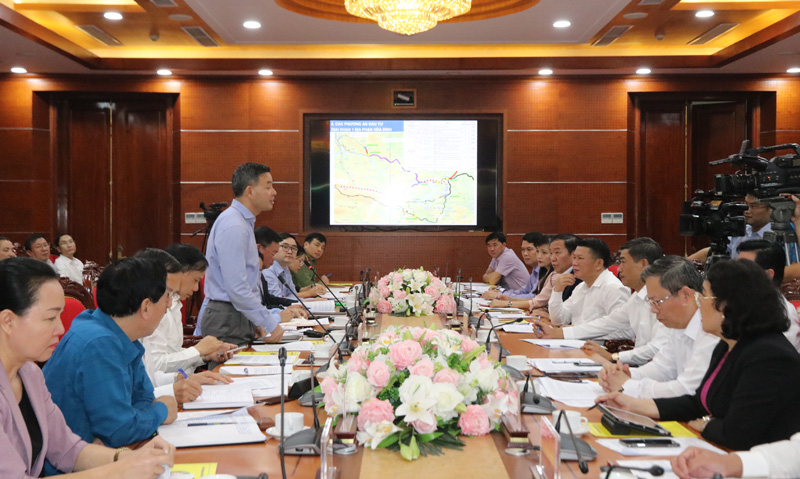
(HBO) – Secretaries of the Party Committees, Chairpersons of the People’s Committees and other officials of Hoa Binh and Son La provinces on October 27 had a working session to discuss the Hoa Binh-Moc Chau (Son La) expressway project.
 Ngo Van Tuan, Secretary of the Party Committee of Hoa
Binh province, speaks at the working session.
Ngo Van Tuan, Secretary of the Party Committee of Hoa
Binh province, speaks at the working session.
The investment plan of the Hoa Binh-Moc
Chau project that is under the Public-private partnership (PPP) model was
approved by the Prime Minister under Decision No. 579/QD-TTg dated May 17,
2019. The expressway is designed to run a total length of 85km, with 49km in
Hoa Binh and the remaining 36km in Van Ho district, Moc Chau town, Son La
province.
The project has total investment of about
22.29 trillion VND, including 5 trillion VND worth of land in the two
provinces.
Ngo Van Tuan, Secretary of the Party
Committee of Hoa Binh province, and Nguyen Huu Dong, Secretary of the Party
Committee of Son La province, shared the view on the significance of the
project to both localities.
The project would be extended to Dien Bien
province, they said, urging competent agencies and investors to conduct
thorough study in order to ensure the feasibility of the project. /.
Hoa Binh province is undergoing a dynamic transformation amid Vietnam’s national digital transition. Building on Poliburo’s Resolution No. 57-NQ/TW on breakthroughs in science, technology, innovation, and national digital transformation, the province has rolled out a wide range of practical action plans. A standout initiative is the "Digital Literacy for All” movement, an effort to ensure that no one is left behind in the digital era.
Hoa Binh province is undergoing a dynamic transformation in the wake of the national digital transformation movement. Building on Resolution No. 57-NQ/TW of the Politburo on breakthroughs in science, technology, innovation, and national digital transformation, the province has implemented a wide range of practical action plans. A standout initiative is the "Digital Literacy for All” movement ambitious effort to ensure that no one is left behind in the digital age.
With a spirit of unity and proactive problem-solving, the Party Committee, the government and the people of Dong Lai Commune (Tan Lac District) have made great strides in implementing the resolutions of the 24th Party Congress of the commune for the 2020 - 2025 term. Focusing on leadership and practical actions, the commune has brought the Party’s resolutions into daily life, creating strong impacts and pushing the local development forward.
Amid the nationwide push for digital transformation, young people in Hoa Binh Province are stepping up as dynamic pioneers, applying technology to enhance Youth Union operations and expand the reach of youth-led initiatives. Through creativity and adaptability, Youth Union organizations at all levels have introduced a series of practical solutions, contributing to modern governance and community development.
In recent years, An Nghia commune, located in Lac Son district, has stepped up administrative reform, focusing on improving the quality and efficiency of its single-window service unit for receiving and processing administrative procedures. These improvements have helped create favourable conditions for local residents and organisations to handle administrative procedures, contributing to the commune’s broader socio-economic development.
The Prime Minister-approved master plan to develop the multi-use value of forests ecosystems through 2030, with a vision to 2050, aims to improve the management and sustainable use of forest resources, create jobs, increase incomes, and improve the living standards of ethnic minorities, people in mountainous and remote areas, forest workers and those living near forests.



 Ngo Van Tuan, Secretary of the Party Committee of Hoa
Binh province, speaks at the working session.
Ngo Van Tuan, Secretary of the Party Committee of Hoa
Binh province, speaks at the working session.